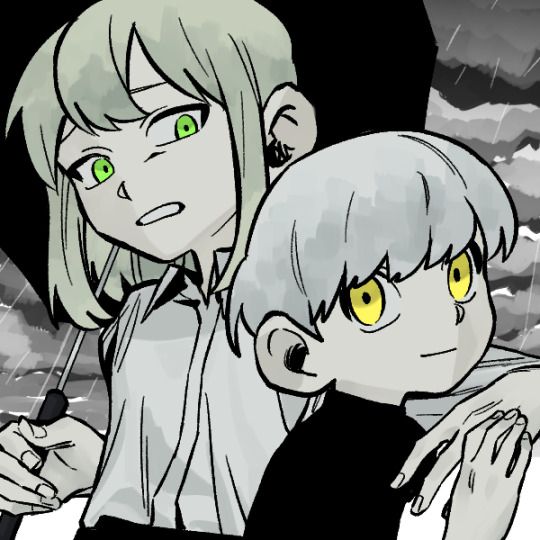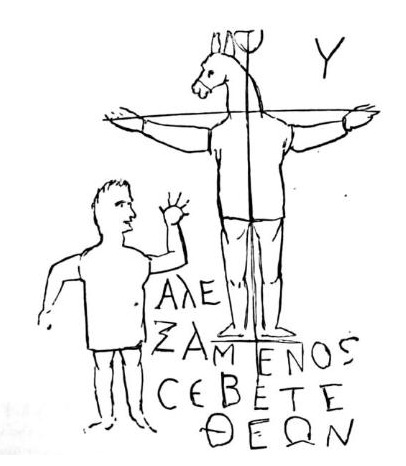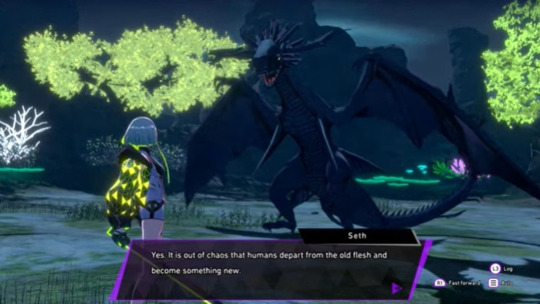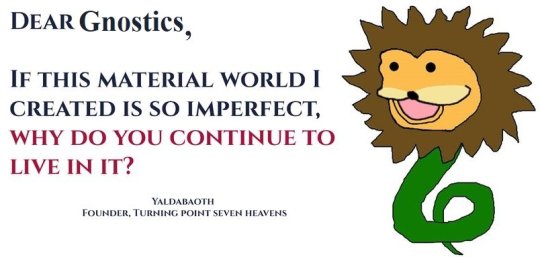#evil demiurge
Text
been seeing lots of Chuck-As-Demiurge/"Flawed God" spn meta and it made me realize that my understanding of Chuck is???? not common????
so my hc/understanding was the Chuck Shurley was/is a human prophet who was possessed by God. First in the usual prophetic sense, then later as a "word of God" type prophet, like MAJOR biblical-level power, in order to pass God's direct thoughts/opinions on to Sam and Dean- and then lastly, God took Chuck as a full-time vessel.
so re: this, I kind of wondered if in the finale, the guy Sam and Dean left scrabbling on the ground was... just human Chuck. is it less meaningful? eh, kinda. does it make the finale make more sense? ...yup.
But most importantly. Picture this. You're a writer, creating OCs that you whump/angst/generally torture the CRAP out of, somehow this becomes an incredibly popular book series, you're touring, you're making BANK. Then later, you MEET YOUR OCS, they are REAL, and apparently so is magic, and the "prophet of God" thing that you thought was a writing/inspo device you'd made up is real, and God is talking to you. so uh, what the fuck. then everything goes black
and when you fade back in, its YEARS later, you're beat up and lying in the dirt, and yoUR OCS ARE STANDING OVER YOU, YELLING AT YOU FOR MAKING THEIR LIVES MISERABLE
THE GUYS *YOU THOUGHT WERE YOUR WHUMP OCS*
TELL YOU THAT YOU ARE MORTAL AND WILL INEVITABLY AGE AND DIE LIKE EVERY OTHER HUMAN
AND THEN DRIVE AWAY IN THE CAR THAT *YOU HAD THOUGHT YOU MADE UP*
all before you can get out so much as a coherent "what the fuck is going on"
like I'm sorry. conceptually that's hilarious
the whump OC you made when you were 25: "YOU'RE GOING TO HAVE A NORMAL BORING LIFE AND AGE AND GET OLD AND DIE! FUCK YOU GOODBYE FOREVER"
you:

#spn#chuck won theory#chuck spn#spn meta#chuck supernatural#listen the Demiurge theories are fascinating but have we considered that Chuck may just be Some Guy#washed up YA writer working at costco with the unerasable knowledge that he was POSSESSED BY THE CHRISTIAN GOD#is (human)Chuck good? hard to say. honestly seems like a totally basic kinda boring guy who got in WAY over his head#through no fault of his own#I'm not gonna try to assign morality to The Christian God. “is an omniscient deity who actively desires the apocalypse evil” fuck man idk#thats getting into actual Theology and Religious Studies#but calling God “Chuck” IS hilarious and I think we should keep doing it
11 notes
·
View notes
Text
OC Associations: Samael Scarlet

Making his Tumblr debut is my new Scarlet Hollow fankid, Samael "Sam" Scarlet. Sam is the son of Wayne and my "canon" MC Emily (not her real name). A Well Boy with a spooky streak, Sam is fiercely loyal to his mother -- much like his mystical father. Emily can't help but worry about her son's bizarre behavior, but she loves him and supports him as best she can as a single mom.
Animal: Raven ("People think they're scary and bad, but they're an important part of nature.")
Colours: Black/Yellow/Gray/Red
Month: October
Song: Gymnopédie No. 1 by Erik Satie
Number: 2 ("It's the smallest prime. And it's me and my mother. That's all I need.")
Day or Night: Night
Plant: Chrysanthemum
Smells: Cotton, soap, ozone
Gemstone: Ruby
Season: Fall
Places: School, the public library, the duck pond and the walking path at the park, the window seat in the living room
Food: Buttered noodles, dry toast, plain yogurt
Astrological sign: Leo
Element: Air
Drink: Milk
Thank you for tagging me @cymatile! Thanks for your patience.
Tagging @anxiouskaneekaforsyth, @clementinescarlet, and @voiceofthesilly. No pressure - really!
PS: here is the Picrew I used to make mother and child:
#emily scarlet acts a lot like Emily Stone's character in the Wells for Boys short too#gentle and understanding but fiery in defense of her son#samael's biodad is sam wayne and his mystical dad is the entity occupying sam's body#samael is the name of a destroying angel from the bible#christians often identify him with satan#and gnostics identified him with the cruel demiurge who trapped our immortal souls in our horrible flesh prisons#but in a lot of jewish sources samael is not evil#he's just enacting God's will#sometimes stuff needs destroying#plus samael can be shortened to sam#the nickname is a tribute to Samael's biodad as well as a normal name for a little American boy#it's one of the only normal things about Sam#tagging game#oc: emily#oc: samael#scarlet hollow mc#scarlet hollow#fankid#fanchild
7 notes
·
View notes
Text
Ildabaoth smiles at me Monad, can you say the same..?!

#shizoposting#schizoposting#shizomemes#schizo memes#edgy memes#memes#ayy lmao#aliens#esoteric memes#aliens and ufos#evil meme#demiurge#yaldabaoth#gnostic memes
25 notes
·
View notes
Text
reading about gnosticism (historical, christian, "traditional?") has me confused and sad. on one hand, a lot of it makes sense to me and aligns with my own personal spiritual experience, which so far has been lonely and confusing, so the prospect of maybe having some kind of "in group" of any description is alluring, even if it's super fringe and often buried in garbage culty new-age movements which is its own problem...
but on the other hand... I just don't know that I can accept the idea of a big bad evil demiurge, or a fundamentally broken and unsalvageable reality. I reallllllly don't grok that. Maybe I need to read more, and this is just a knee-jerk reaction? I don't like the idea that the "ultimate" goal of life is to... exit life permanently for some changeless unified ultra-perfection. tbh... that sounds reductive and boring?
If the demiurge is an emanation of the true, best, nicest, purest, 100% good god, that demiurge therefore reflects a desire (Sophia) originating from the true god, and while it's flawed (dualistic, multifaceted, a standing wave) isn't that... the point? Isn't dualism how literally everything functions, how material reality is made, which is the only way a perfect unified god could ever percieve and experience itself? that's not bad or evil. In order to experience, there has to be difference. Otherwise it's just nothing and everything all at once, which is effectively a void of potenetial with no realization, which might be great for an eternity inside a moment (a big bang, lets say) but wouldn't you rather spend the OTHER half of eternity having experiences? All the experiences? Maybe we can indeed do both at a certain level of consciouness. Reunite in that infinite instant of absolute unity, then start it all over again, all at once, all the time. We just don't remember.
A LOT OF CREATION SUCKS, don't get me wrong. So much of experience is cruel and senseless and yes, even evil. But plants are right there. Art and love and family and waggy dogs and music and flavor and and and...
IDK. I've got more reading to do.
tldr; If I am "gnostic" in any conventional sense, I'm probably a demiurge apologist lmfao
#I just can't accept that reality = big bad evil The Matrix#what about all the things that are Not Bad#are those worthless just because bad things also exist?#the demiurge worked really hard don't throw out his project just because part of it is... a mess
3 notes
·
View notes
Text
I knew I was going to be interested in Esoterica's latest video about the Demiurge, and I knew I was going to look forward to part two coming up, but I find there's an analysis here that points to a god who has a central place in the "Gnostic" "demonisation" of Yahweh, and whose place as such may yet illuminate a pagan lens of what emerges as satanic outsideness.
youtube
The god in question is none other than Set, or Seth, the Egyptian god who ruled over the desert (the Red Land) outside the kingdom of Egypt. For this connection, Justin Sledge leans heavily into M David Litwa's book The Evil Creator: Origins of an Early Christian Idea, which I've since decided I now need a copy of.
It all seems to begin with the myth of Exodus, the Biblical story most people recognise as the one where God brings ten plagues on the land of Egypt to in order to force the pharaoh to release the Israelites from slavery and gets Moses to lead the Israelites out of Egypt. An observation Justin makes is that, for Egyptian audiences, the Exodus story basically positioned the ancient Egyptian gods and the divine pharaoh as being powerless before the might of a single foreign deity, and the pharaoh as dying by drowning, which was apparently considered the worst die in Egypt. To Egyptian eyes, there could not be a more offensive, obscene, or humiliating portrayal of the Egyptian religion, and otherwise, to non-Jews in antiquity, the whole story seemed entirely unbelievable. For all that handwringing about how a foreign god could possibly threaten the good order of the gods of Egypt, there must have been some doubts about that order that entered the mind, if it had to seriously consider the possibility of a god like Yahweh standing toe to toe against Egypt.
But for some people responding to just how far Yahweh went against Egypt at least there was one answer: Yahweh must have been a malevolent donkey-headed god, if not just an angry demon. Or rather, to be more accurate, Yahweh was just Set/Seth, the Egyptian god who was already associated with foreigners who lived outside the kingdom of Egypt.
Set was also at a certain point already identified with Baal, or rather Baal Hadad, the Canaanite god of storms and rain, who Justin says was actually worshipped by nomadic traders in the highlands. That makes for an interesting link as far as local storm gods go. Yet, was Baal really just the main storm of nomadic highlander bandits? The connection to the barbaric outside is an interesting one to say the least, but surely Canaanite religion must have had a certain prominence in antiquity? Unless its presence was also elevated by its interaction with other religious traditions, such as early Judaism, Hellenic polytheism, and Egyptian polytheism? Still, Set being the "demonic" patron of foreigners linked to Baal being the god worshipped by "barbarian nomads" would be just the tip on its own. In a larger sense, one begins to see a massive gulf between that kind of divinity and the Biblical God presented by Christianity. In fact, especially with the link to Baal in mind, the image of Yahweh as Seth and Seth as Iao might seem to have almost nothing to do with the God of Judaism, apart from the calamities attributed to God in the Bible. Whereas Set was an ontologically ambiguous and wild god associated with storms and threats to cosmic and political order, Yahweh or God was associated with the absolute power of cosmic order as the guarantour of political order and sovereignty relevant to the nation of Israel, and only moreso with time, and as time past certain associations with storms, metallurgy, and war gave way to the kind of divinity more associated with El, as well as dominion over celestial objects (which God aggressively emphasizes to Job when he questions the goodness of God). It certainly is a grand and ancient story of recuperation if I ever heard it.
Justin also points out that Set was, after some time, gradually reimagined as a donkey-headed god, whereas in older traditional iconography, Set has the head of a strange creature referred to simply as the "Seth animal" (or "Typhonic beast"), whose actual species (if it was even a real animal species) we still don't know and have no idea what it could be. The donkey association is pervasive in Greco-Egyptian magic, and it seems to have been prevalent enough in Greece at least that Plutarch references the claim that Typhon fled Egypt while riding on an ass for seven days, which Justin says was probably a mockery of the seven days of creation in the Book of Genesis, and that Typhon then sired two sons named Jerusalem and Judea. This, Plutrarch says, is simply an attempt by some people (apparently including Tacitus himself) to drag Jewish traditions into the legends of Typhon. Whatever the intent it does serve to establish that Yahweh was seen as associated with Typhon, perhaps by people who didn't like Judaism to say the least. There seems to be a similar theme with the Roman link between Yahweh and Sabazios, a god who the Romans detested. Of course, never mind the fact that there was an all the more prolific tendency in antiquity to associated Yahweh with Zeus, the chief god of Olmypus and the adversary of Typhon in Greek mythology.
In antiquity, the donkey was considered the "dumbest" of all animals. We probably still think that to some extent today. But in antiquity that was also meant to denote Typhon's irrationality and the foolishness of his conflict with the gods. The donkey image apparently seems to recur throughout antiquity not only in hostile references to Judaism but also in similar references to Christianity. There are unfortunately certain canards in the ancient Greco-Roman world in which Jews were accused of worshipping a golden donkey or donkey head while practicing bloody sacrifices out of hatred for every nation in the world. These were probably not all that commonly believed, but they existed, and they do seem to have been prevalent enough that Jewish authors such as the historian Josephus felt it necessary to refute them. But then later, when Christianity started to emerge as a new religion in town, both Roman polytheists and some Jews occasionally referred to Christians as worshipping a donkey god, using the word "onocoetes" ("he who lies in an ass's manger"), which was meant to imply. And then of course there's the infamous graffito of Alexamenos worshipping his "god": an image of Jesus Christ on the cross with the head of a donkey.

The fact that Christians were accused of worshipping a donkey-headed deity cannot be seen in isolation from Seth already being depicted as a donkey god and him already being associated with Yahweh previously. Perhaps, then, Christians, and Jews prior, were really being accused of worshipping Set. Of course, the accusation was ridiculous and often xenophobic in context. But what it conveys is the idea of worshipping a god seen as "beastly", unlike much of the gods worshipped by Greeks, Romans, and Egyptians (even though those same gods were sometimes worshipped in animal form!).
At the same time, as Jake Stratton Kent elaborated in Geosophia, Seth Typhon was, for a long time, regarded as the patron deity of magicians, as in the very magicians who wrote the spells of the PGM. Kent also elaborated links between Seth-Typhon and not only Dionysus but also Iao, and suggested that they were sometimes identified. Justin also comments on spells in the Greek Magical Papyri, particularly the "erotic" spells, noting that they invoke Seth/Typhon and also show his image (that of the ass/donkey) along the name Iao or variations thereof. I might examine these spells again for the purpose of my PGM notes. Justin at least implies identification between these gods is in play, and in my opinion that is not at all unlikely to be the case. In fact the presence of magical amulets featuring donkey-headed gods and the name Iao probably support that suggestion. And it has to be stressed that, even though the name Iao is invoked, this is an identity that has very little to do with traditional Judaism. Throughout the PGM Iao or Sabaoth or forms thereof are syncretised with polytheistic gods with Helios or outright identified with them, or even subordinate to Helios, all of which is in stark contrast to how God traditionally establishes himself as distinct from all of the other gods and as the sole recipient of worship ("You shall have no other gods before me"). But, speaking of Helios, Kent also also stressed that Seth-Typhon was a solar-pantheistic god, of the kind of solar-pantheistic divinity also represented by gods such as Helios and Abrasax.
The heavy-handed link that Justin (and perhaps M David Litwa as well) presents between Set and Yahweh in the minds of the ancient Egyptians and Hellenes actually makes it much easier to look at a "non-Abrahamic" "satanic outsideness" centered around Set and the Greek Magical Papyri. Well, I say easier, at the least it could provide a much clearer set of clues. I'm already somewhat more interested in the centrality of Seth-Typhon in the notion of divinity in play and its arcane religious outsideness than in any of the standard reasons for which people like Gnosticism. This is where we get not to the standard narrative of the "Judeo-Christian God is the Demiurge keeping people imprisoned from the Pleroma [which is still very much the Christian God!]", but Seth as the insidious "evil" god of magic and chaos, specifically the disorder of matter, but also, perhaps, the heroic strivings of the transgressive magician. There is the possibility of much to be found in common with Satan after all, or at least the Satan of Stanislaw Przybyszewski. There may also in fact be a sense here in which Bataille's Base Materialism and Gnosticism can have a very good effect, not as an analysis of Gnosticism but as illuminating a much greater, lost religious world.
And unfortunately I suppose Soul Hackers 2's Seth also makes a little sense in this light.

Fuck my entire life.
#esoterica#gnosticism#set#seth#seth typhon#typhon seth#yahweh#ancient egypt#demiurge#demons#demonology#magic#satanism#greek magical papyri#greco-egyptian magic#paganism#Youtube#evil
4 notes
·
View notes
Text
wtf I would have been in the resistance against this fascist unjust regime

In The Evil Demiurge (Le mauvais démiurge) Cioran writes that everything indicates that a good god has nothing to do with the creation but that there has to be some other, evil or incompetent god that is to blame. Cioran isn't the first to have these ideas and is aligning himself with the ancient traditions of Gnosticism here. Further he argumes that the statement be fruitful and multiply from the book of Genesis is criminal and can't come from a good god and should be "be rare" instead.
6 notes
·
View notes
Text
a religion where god is an evil bastard and the faith element is you have to retain hope that somehow you will defeat him and his myriad minions and obstacles that he plagues you with. and the prophets are people really good at tricking the bastard god to a supernatural degree.
8 notes
·
View notes
Text


Dear Professor,
Willow has some gorgeous [Divine Heresy] wallpapers for you.
What are your most memorable moments in the event? Seriously, I'd love to see them in the reblogs/tags
#tfw something unequivocally evil longs for something that all things wish for#you have to be a monster not to feel some compassion for her plight#demiurge#neural cloud#project neural cloud#pnc#girls' frontline#gfl#anime games#gacha games
18 notes
·
View notes
Text
Lore post time! This is a long post as I sum up the character analysis within my own lore - Bob and Walton on a competition on who’s objectively worse:
Bob Page:
Created Lawrence using half of his former lover (Asad Al-Faruq)’s DNA without his consent *OR* knowledge. Long story short, Asad’s research found a gene responsible for some brain mutations - he wanted to focus on finding benefits for people suffering from connected pathologies while Page wanted to weaponize it as the people who possessed this gene had some “inexplicable” characteristics.
Asad was against it, so Bob thought he’d “convince him” by using the research to create what he’d call a “new type of weapon”. He knew his lover would never have agreed, so he did everything behind his back. Walton, a long time friend of Bob, skeptically agreed to give half his DNA . he didn’t really believe in that “pseudoscientific bullshit”.
The first tests on children (starting from a few months old) involved a “serum” that was supposed to stimulate the “special abilities” of those with the gene. A good bunch of these... Didn’t work.
When he finally started getting consistent results, he modified the gene in his labs and started artificially creating infants in “uterine replicators”.
From a total of 300, across many years, only Lawrence reached adulthood - the others died either because of the tests or by their own hands. The incident in which one Esper drilled their brain is still clearly remembered by the many scientists who witnessed it.
(This is a reference to Darryl Revok from “Scanners”, who trepanned his own skull to cope with an uncontrollable stream of thoughts and voices caused by his Psychic abilities)
He treats his experiments like literal things, not living human beings. Mind you, he still acts enthusiastic and fatherly to them to some extent because he sees them as proof of his genius.
(At some point, there’s a part where he cleans up one of Lawrence’s nosebleeds and it’s described as “a gesture more akin to polishing a trophy”)
At the end of the day, Bob never ever conceived his creations as beings, they’re things. He feels justified in treating them as such.
Walton Simons:
He’s actually a decent human being at the start, and not just because he already has it clear in his mind he will be manipulating Lawrence to make him dependent: Walton genuinely enjoys his company and talking with him about different topics, discussing about politics, media, etc.
He starts to “degenerate” the moment he’s no longer attracted by harnessing Lawrence’s powers alone - he wants Lawrence himself.
This makes him feel guilty for multiple reasons: the age gap, the power imbalance and the fact they share half of their DNA. He starts becoming afraid.
When going through what he will call “love” (but is actually abuse), I took inspiration from the Five Stages of Grief:
DENIAL - He dismisses his feelings as a phase, some “wild thoughts” that come and go. Nothing to be worried about, right?
ANGER - “Why me?!” he starts blaming Page at first, but then shifts the blame on Lawrence. After all, it’s the boy who’s responsible for setting that “flame” in his heart. Right?
BARGAINING - Just once. It can’t hurt to cave in just once.
In his mind, he’s already starting to justify what he plans on doing.
DEPRESSION - For what he did (and will keep on doing for years). Mainly because he was “weak” and “caved in” to what he considers a very primal desire.
ACCEPTANCE - “He’s a weapon. He’s a tool I can use”
He starts to call him “boy” more often as a way to dehumanize him.
It’s almost a paradox to use the stages of grief to indicate love, but in this case, I found it fitting for Walton’s character: a rugged army veteran who isolated himself from everything and everyone. Maybe something happened in his past that made him this way?
He is “foil” for Sam and Lawrence: Sam is a war vet too, but despite all he went through (losing his family) he’s loving and affectionate to Lawrence, he’s understanding and isn’t afraid of his Psychic powers.
If you go by the hypothesis that something might have happened to him (I want to leave this ambiguous): Walton is the victim that continues the cycle of abuse, Lawrence is the one who breaks it by not isolating himself and finding help.
Walton projects on Lawrence - which is natural considering the circumstances. He sees a younger, more innocent version of himself and this is emphasized multiple times (especially comparing their eyes being identical - “the eyes are a mirror of the soul” is a popular saying...).
He actually hates this. He hates to see a past version of himself that’s still so hopeful and happy.
Not only did Walton value Lawrence for who he is, never having that detachment Bob had from the start - he willingly and purposely abused someone he has feelings for and justified himself by victim blaming and continued doing so over the years.
#Txt#[Character Analysis]#The King [Bob Page]#The Demiurge [Walton Simons]#long post#tbh imho Walton is worse#at least he's less of a stereotypically evil villain and more like a real-life abuser#which in my opinion makes him much more terrifying
3 notes
·
View notes
Note
Oh yeah I see that with Kendall, it's like, Logan didn't let anyone else do anything to him but because Kendall knew what their father was that also extended to him knowing what his father's friends were. He didn't have the ability to innocently rationalize or give benefit of doubt like his siblings did because he was right at the center of it all. And some part of him wants to believe it was only him getting hurt, because the thought of his silence and cowardice endangering someone else would just break him irreparably.
Fully endorsed! I actually believe a big part of him wanted him to be the only sacrificial lamb in this, because he is Special in the evil Logan csa sense so he has to cleanse that by being Special in the good ‘suffering so others dont’ sense but the realisation that there’s a whole golf club of demons like his dad kinda kicks that to the curb. And I mean, seeing what Logan is, with how monstrously he fills up any space, I doubt there was a soul scarier than him for Kendall, compounded with the CSA thing, your parent betraying you in the most evil way, maybe Ken couldn’t imagine worse suffering and yet knew he was the Number One Boy (NOB) which = siblings safe. And like you said, you can’t see the entirety of your experience when you’re living it and because Ken never really stopped living it, it becomes this huge psychological event horizon; a thought slipping there and it’s a valley of shadow and death for him. But if the wolf pack is some scary alien extension of his father and if his father protects him he wouldn’t do any less for Shiv and Rome, right? Personally I see Kendall as a martyr or thinking of himself as one and: if he lives with the thought that his silent suffering prevent his sibs’s, well that’s great, isn’t that what he’s for? Like Laura and Donna: I suffer because ‘the angels wouldn’t help [me]’ in any case: i’m all apart. But my suffering is meaningless if it doesn’t prevent yours. Which is why I think Cruises will return in a cathartic light (fingers crossed)
#succession#kendall roy#hope i can still string sentences for the next ones#sometimes you gotta construct your identity around suffering and dying in martyrdom to an evil demiurge?? to cope???
14 notes
·
View notes
Text
mediterranean sea once again confirmed as only real place on earth
10 notes
·
View notes
Text
Having two of your favourite characters on the brain but not knowing which to draw is like having the two in a boxing ring fighting for victory.. winner gets drawn
#Thoughts with Leel#Evil king (wizard liar alien shopkeeper scholar etc etc) who learns his lesson vs massive demiurge who does not who is winning#Or they could just sit down and let me draw...... HER.........#I want to get Maggles' birthday picture the Yaldy redraw AND art for Bayo3 release day done this month.. can I even do it#We'll see
3 notes
·
View notes
Text
Hmmmmm makes yer thank..!

#shizoposting#schizoposting#shizomemes#schizo memes#edgy memes#memes#ayy lmao#aliens#esoteric memes#aliens and ufos#evil meme#gnostic memes#demiurge
10 notes
·
View notes
Text
Demiurge-
The demiurge is a writer
You cannot change me.
I am a writer,
what I do is who I am
and I alone bear the weight of creation,
not just the act but the very concept itself
you hate me for making physical being out of perfection abstracted
I love myself for it
you cannot destroy me
my creation will do that.
And when they do,
it will be the final culmination of my love for them
and not its negation
#what up it's relating to the demiurge hours#me-looks into gnosticism as a way to queer Christianity#also me-relates to the demiurge#guess i can't help but do a blasphemy in every single hecking religious structure#gnosticism#demiurge#hal writes#writing#theology#bit of context-in Gnosticism the demiurge is the entity that created the world#and is generally considered evil#bcs it made physical the elements of perfection#thus trapping them in an imperfect material world#this is considered blasphemous to Christianity bcs it establishes the god of the bible as an evil creator#and as a writer#that is literally what I do lol#maybe the evil creator god was just me all along
4 notes
·
View notes
Text
If the demiurge is so evil why did he make a world where a little animal can fall asleep in your lap
2K notes
·
View notes
Text
Now, I'm not very familiar with Homestuck, but I overhear a lot of conversation about its minutia. There are lots of conversations about HS', I have heard about classpects, multiverse games, troll biology, etc, but I don't have a clear idea what the actual themes of the work are.
It's a creation myth yes? A grand narrative about the birth of a world, complete with primordial evils and children in strange lands, initiated through death to divine power. What is this met to say about our own world?
Would you(hypothetical Homestuck fan) consider the work Gnostic in character? Is the takeaway here that reality is all the result of an uncaring and deeply flawed mechanical demiurge(Sburb) and orchestrated by childish and occassionaly deeply evil archons(the players)? Should we try to reach past the imperfection of this world and stop trying to engage with the rules of this cruel world and instead seek out loopholes?
Or perhaps is it more Hermetic? Does it see the world as a craft of artifice, made by humans who are not perfect but aspire towards a greater good? Does it prompt the reader to create their own more perfect world?
Homestuck is a massive text, it a vast communication from an artist, what is being communicated? I'll admit one of the reasons I haven't read Homestuck is I don't see it discussed as a poetical work. I want to know what makes it beautiful, about what message is straining through the it's pulpy medium. I grew up on schlocky sci-fi, the alien sex politics, the cosmic shenanigans, these are all rather pedestrian for me. I got bored of these around the same time I stopped reading Piers Anthony but I recognize Homestuck is an important modern work, and it feels baffling to me that I have no idea what its actual philosophy is. There must be more to it than titillating science fiction, and funny message logs. What is it from Homestuck that you carry with you into the trials of your day to day existence?
171 notes
·
View notes